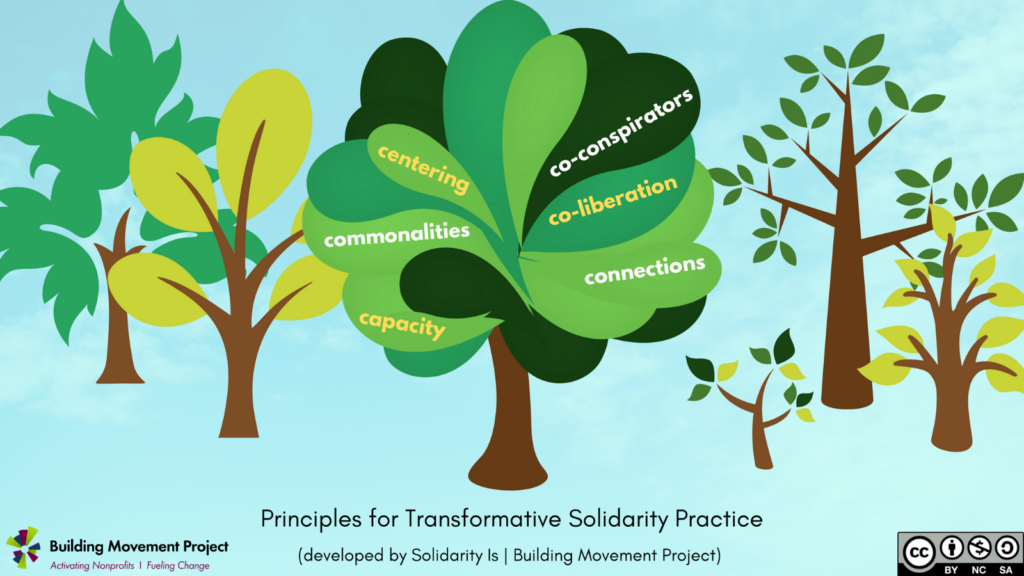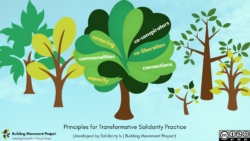Dec
14
2020
Written by Leah Steimel (New Mexico Coordinator)
Leaders of ten New Mexico service nonprofits gathered in mid-November 2020, virtually, to share their insights and challenges with building alliances and gaining momentum toward social justice for the communities they serve. This group of leaders has been meeting together through the Common Good Action Project (CGAP) over many months, and most of them know each other through the collaborative service efforts of their organizations. But though they have met around numerous conference tables in the past, those conversations were usually about how to meet the needs of their communities, how to best use scarce resources, and how to spotlight an issue or change a bad policy — all important and urgent topics, no doubt, consuming their time and energy.
With the CGAP gatherings, we are holding space for these leaders to reimagine how they engage in their work, empower the people they serve, build relationships and trust, and learn from each other. The COVID-19 pandemic has made gathering in person impossible, but the need for connection and support continues to be a high priority for our work.
For the November 2020 CGAP session, Deepa Iyer, Director of Movement Building at BMP, was the invited guest and presented her work on transformative solidarity practice, SolidarityIs. Solidarity, says Deepa, is a verb, a practice, and a strategy. And the nonprofit leaders were enthusiastic to talk with each other about it.

Centering is a key principle of solidarity, and it prompted one leader to describe how this resonated with her. She shared that her organization saw rapid growth and receptiveness to their member-based services, but when people started to easily come to them, she and her colleagues realized that the communities they most wanted and intended to reach were getting farther away. Centering on the mission and true intentions of the organization helped them course correct.
Practicing internally what you fight for in the community is a centering practice for service nonprofits. More than one leader shared how difficult it is to dedicate resources in the organization for staff benefits and staff care. “It feels self-serving, but it also feels like a solidarity statement for my team.” This has been particularly important with the impact of COVID, and the added stressors to staff and community.
The principles of Commonalities and Connections generated lots of conversation among the group members. Finding similarities and making connections by understanding histories of oppression among different groups is critical to solidarity practice, but we should be mindful about not flattening or equalizing their unique experiences. The CGAP leaders talked about the concern of making assumptions that shared values exist among community partners. The “why” injustice is happening is commonly misunderstood, and strategies and decisions often reflect that. One leader felt like this impacts effective action, and that “making time to step back and center with the community to really understand the ‘why,’ and to prioritize the space to make that happen is important.” Another leader spoke about how her organization is bringing staff together more often, trying to not assume they all have shared goals. Conversations among staff about systemic racism and how it shows up as they do their work have been helpful to gain a deeper understanding of each other and their constituents.
For service providers, the capacity to meet needs in the community is a constant struggle, even more so during the pandemic. But making every effort to step back and make time for the conversations described here, within their organizations, with their constituents, and across organizations is the hard work that New Mexico service nonprofits are engaging in to push for social change.
A final principle of solidarity, Co-Conspirators, speaks to the fact that we need to take risks and use our privilege and power to work toward change because a better future, one that ameliorates the inequities and recognizes the trauma of affected communities, is something that we all have a stake in after all. There are many ways to interpret the term, but one leader in the group embraced it wholeheartedly: “We are always looking for ways to be a co-conspirator!”
The CGAP leaders will meet quarterly in 2021 to continue the conversation.

